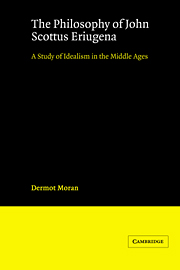Book contents
- Frontmatter
- Contents
- Preface
- Acknowledgments
- Chronology
- List of abbreviations
- 1 European intellectual culture in the ninth century
- 2 The predestination debate
- 3 Eriugena's life and early writings
- 4 The Greek awakening
- 5 The Periphyseon
- 6 Eriugena as philosopher
- 7 Eriugena's sources
- 8 Dialectic, philosophy, and the life of the mind
- 9 The meaning of human nature
- 10 Self-knowledge and self-definition: the nature of human knowing
- 11 The meaning of non-being
- 12 The meaning of nature
- 13 Eriugena's influence on later mediaeval philosophy
- 14 Conclusion
- Bibliography
- Index nominum
- Index rerum
- Frontmatter
- Contents
- Preface
- Acknowledgments
- Chronology
- List of abbreviations
- 1 European intellectual culture in the ninth century
- 2 The predestination debate
- 3 Eriugena's life and early writings
- 4 The Greek awakening
- 5 The Periphyseon
- 6 Eriugena as philosopher
- 7 Eriugena's sources
- 8 Dialectic, philosophy, and the life of the mind
- 9 The meaning of human nature
- 10 Self-knowledge and self-definition: the nature of human knowing
- 11 The meaning of non-being
- 12 The meaning of nature
- 13 Eriugena's influence on later mediaeval philosophy
- 14 Conclusion
- Bibliography
- Index nominum
- Index rerum
Summary
In this book I have argued that Eriugena's philosophy should not be interpreted solely as a hierarchical metaphysics of order, but in fact is an idealist system in which the diversity of nature is understood to be produced by the multiplicity of perspectives of the viewing subject. I trust that my use of the term “idealist” has become clear over the course of this book.
The results of this investigation have a bearing on the manner in which the writings of John Scottus Eriugena must be interpreted. They are also important for the wider interpretation of the history of mediaeval philosophy in general.
Eriugena's philosophy is a daring attempt to express in dialectical terms the meaning of the relations between human and divine nature. As we have seen, he conceives of these relations as an interplay between non-being and being, finite and infinite, particular and universal, uncreated and created. The fourfold division of nature, then, is a schematic representation of what is essentially a dynamic dialectical process. The traditional interpretation of the four divisions as four levels of a hierarchy of being is misleading in that it neglects the dynamic negative dialectic, which Eriugena applies to all affirmative onto theological statements. The rigid hierarchy of beings must be understood from a different perspective, namely, as an example of four interrelated ways of viewing what is essentially the formless and infinite unity of divine nature.
- Type
- Chapter
- Information
- The Philosophy of John Scottus EriugenaA Study of Idealism in the Middle Ages, pp. 282 - 287Publisher: Cambridge University PressPrint publication year: 1989



